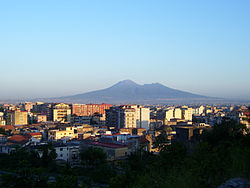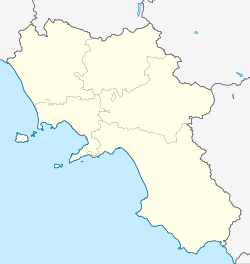This article needs additional citations for verification. (December 2008) |
You can help expand this article with text translated from the corresponding article in Italian. (January 2022) Click [show] for important translation instructions.
|
Pagani (Italian: [paˈgani]; Neapolitan: ('e) Pavane, [(e) pɑˈvɑːnə]) is a town and comune in Campania, Italy, administratively part of the Province of Salerno, in the region known as the Agro nocerino-sarnese. Pagani has a population of 35,834, as of 2016.[3][4]
Pagani | |
|---|---|
| Comune di Pagani | |
 Panoramic view | |
| Coordinates: 40°44′N 14°37′E / 40.733°N 14.617°E | |
| Country | Italy |
| Region | Campania |
| Province | Salerno (SA) |
| Government | |
| • Mayor | Raffaele Maria De Prisco (s. 5.10.2020) |
| Area | |
| • Total | 12 km2 (5 sq mi) |
| Elevation | 35 m (115 ft) |
| Population (2004)[2] | |
| • Total | 34,775 |
| • Density | 2,900/km2 (7,500/sq mi) |
| Demonym | Paganese (Paganesi) |
| Time zone | UTC+1 (CET) |
| • Summer (DST) | UTC+2 (CEST) |
| Postal code | 84016 |
| Dialing code | 081 |
| Patron saint | |
| Saint day | |
| Website | Official website |
History
editIn the period before the Roman supremacy in southern Italy, it was included into the territory of Nuceria, the chief town in the Sarnus valley – Herculaneum, Pompeii, Stabiae and Surrentum all being dependent upon it, according to many archaeologists. It maintained its allegiance to Rome till 309 BC when it joined the revolted Samnites.[5] In 308 BC it repulsed a Roman attempt to land at the mouth of the Sarnus, but in 307 BC it was besieged and surrendered. It obtained favourable terms, and remained faithful to Rome even after Cannae.[5]
Hannibal reduced it in 216 BC by starvation, and destroyed the town of Nuceria. The inhabitants returned when peace was restored. Even during the Social War it remained true to Rome. In 73 BC it was plundered by Spartacus.[5]
In the Middle Ages (around the 9th century) a small colony of Saracens was introduced in the town by permission of the Dukes of Naples, but it lasted only a few decades.
The territory was merged back to Nuceria, which took the name of Nuceria Paganorum (Italian: Nocera dei Pagani), inspired by the noble Pagano family living in the castle of Curtis in Plano, in modern-day Pagani.
Churches and religion
editPagani is home to some well-known churches and basilica, including:
- The Shrine of Saint Mary the Crowned of Carmel (Italian: Santuario di Santa Maria Incoronata del Carmine), commonly known as the Shrine of Our Lady of the Hens (Italian: Santuario della Madonna delle Galline). This Marian shrine hosts the annual Feast of Our Lady of the Hens (Italian: Madonna delle Galline). During this week, people dance in the streets to the tammurriata (or tarantella).
Sports
editThe town is home to the Italian third-division Serie C football club, Paganese Calcio 1926, whose home ground is the 6,000-seat Stadio Marcello Torre.
See also
editReferences
edit- ^ "Superficie di Comuni Province e Regioni italiane al 9 ottobre 2011". Italian National Institute of Statistics. Retrieved 16 March 2019.
- ^ "Popolazione Residente al 1° Gennaio 2018". Italian National Institute of Statistics. Retrieved 16 March 2019.
- ^ "Pagani (Salerno, Campania, Italy) – Population Statistics and Location in Maps and Charts". www.citypopulation.de. Retrieved 2017-06-05.
- ^ "Pagani – Italy: Information and Town Profile". Comuni-Italiani.it. Retrieved 2017-06-05.
- ^ a b c Belsito, Francesco; De Pascale, Carmine (2013). Storia di Pagani. Monumenti, personaggi, tradizioni. Angri: Gaia.
External links
editMedia related to Pagani at Wikimedia Commons


